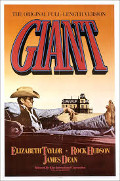
Directed by
George Stevens
201 minutes
Rated PG
Reviewed by
Bernard Hemingway


Giant
Although probably best known today for providing James Dean's final screen appearance Giant is George Stevens's best film albeit at times looking like a soap opera blown up to epic proportions.
Based on a novel by Edna Ferber Giant encompasses a twenty-five year time period and chronicles the changing lives of its characters– the Bickford family, third generation Texas cattle ranchers.
Opening in the 1920s it begins with the whirlwind courtship of Bick Benedict (Rock Hudson) and Leslie (Elizabeth Taylor), a well-educated independent-minded young woman who has little truck with the parochial ways of ranch life. Enter Jett Rink (Dean) a ranch-hand with a chip on his shoulder who falls in love with the unpossessible Leslie something which only exacerbates his hatred of Bick.
We follow the tribulations of Bick and Leslie’s marriage, the challenges their children put their way (the wimpy son who wants to be a doctor is played by Dean’s Rebel Without A Cause co-star, Dennis Hopper whilst also from that film Sal Mineo has a minor role) and the transformation of attitudes toward women and the Mexican American labouring class aka “wetbacks” (although in actuality it doesn’t seen today that they are much changed),
Typical of marquee production of the era, Giant is designed to blow the small screen competition to dust - it’s big, colourful and long - but it also tries to give its portrait of characters and their lives depth and in a good measure it achieves that even if at times it overdoes the syrupy sentimentalism.
Although not his best performance Dean has the opportunity to age his angry young man persona into an angry old man and he does it surprisingly well given the limited scope his character gets from the screenplay whilst Taylor and Hudson who were seasoned troopers in the period’s taste for melodrama both provide a solid centre to a film which gave Stevens a Best Director Oscar, the only one of its ten Academy Award nominations in what was a strong year for film.
Want something different?





